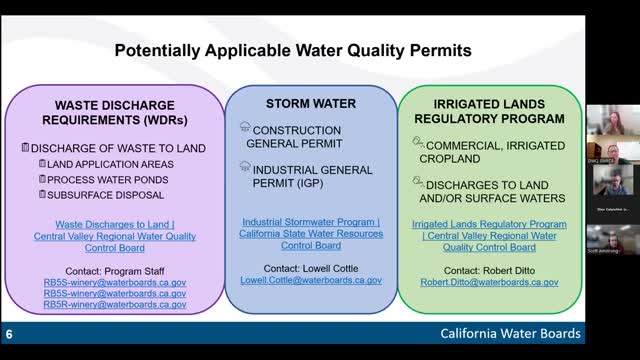Wineries face urgent permit changes amid regulatory crackdown
October 31, 2024 | State Water Resources Control Board, Agencies under Office of the Governor, Executive, California
This article was created by AI summarizing key points discussed. AI makes mistakes, so for full details and context, please refer to the video of the full meeting. Please report any errors so we can fix them. Report an error »

During a recent government meeting, officials discussed the regulatory landscape for wineries in California's Central Valley, particularly focusing on stormwater and wastewater discharge permits. Wineries may be required to obtain permits from the stormwater program, which includes a construction general permit for sites disturbing one or more acres and an industrial general permit for industrial activities. Additionally, the irrigated lands regulatory program oversees commercial irrigated agriculture, including nurseries.
The meeting highlighted the permitting options available for wineries, which currently fall under individual Waste Discharge Requirements (WDRs) or a waiver specifically for small food processors, including wineries. This waiver, referred to as the winery waiver, is set to expire early next year, prompting a shift in regulatory focus. Wineries discharging over one million gallons of wastewater annually typically require individual WDRs, a process that involves detailed facility-specific permits and board approval. Conversely, most wineries discharging less than one million gallons are covered under the winery waiver, which is divided into three tiers based on discharge volume.
Officials noted that approximately 1,200 operating wineries in California may be discharging wastewater without the necessary permits, raising concerns about compliance and potential liabilities. The Central Valley, a significant wine production area, is particularly affected, with many wineries potentially operating without appropriate discharge permits. The meeting underscored the urgency for these wineries to begin the permit application process to avoid enforcement actions and fines.
As the regulatory landscape evolves, wineries in the Central Valley are encouraged to transition from the expiring waiver to the winery order or individual WDRs to ensure compliance and sustainability in their operations.
The meeting highlighted the permitting options available for wineries, which currently fall under individual Waste Discharge Requirements (WDRs) or a waiver specifically for small food processors, including wineries. This waiver, referred to as the winery waiver, is set to expire early next year, prompting a shift in regulatory focus. Wineries discharging over one million gallons of wastewater annually typically require individual WDRs, a process that involves detailed facility-specific permits and board approval. Conversely, most wineries discharging less than one million gallons are covered under the winery waiver, which is divided into three tiers based on discharge volume.
Officials noted that approximately 1,200 operating wineries in California may be discharging wastewater without the necessary permits, raising concerns about compliance and potential liabilities. The Central Valley, a significant wine production area, is particularly affected, with many wineries potentially operating without appropriate discharge permits. The meeting underscored the urgency for these wineries to begin the permit application process to avoid enforcement actions and fines.
As the regulatory landscape evolves, wineries in the Central Valley are encouraged to transition from the expiring waiver to the winery order or individual WDRs to ensure compliance and sustainability in their operations.
Don't Miss a Word: See the Full Meeting!
Go beyond summaries. Unlock every video, transcript, and key insight with a Founder Membership.
✓
Get instant access to full meeting videos
✓
Search and clip any phrase from complete transcripts
✓
Receive AI-powered summaries & custom alerts
✓
Enjoy lifetime, unrestricted access to government data
30-day money-back guarantee

